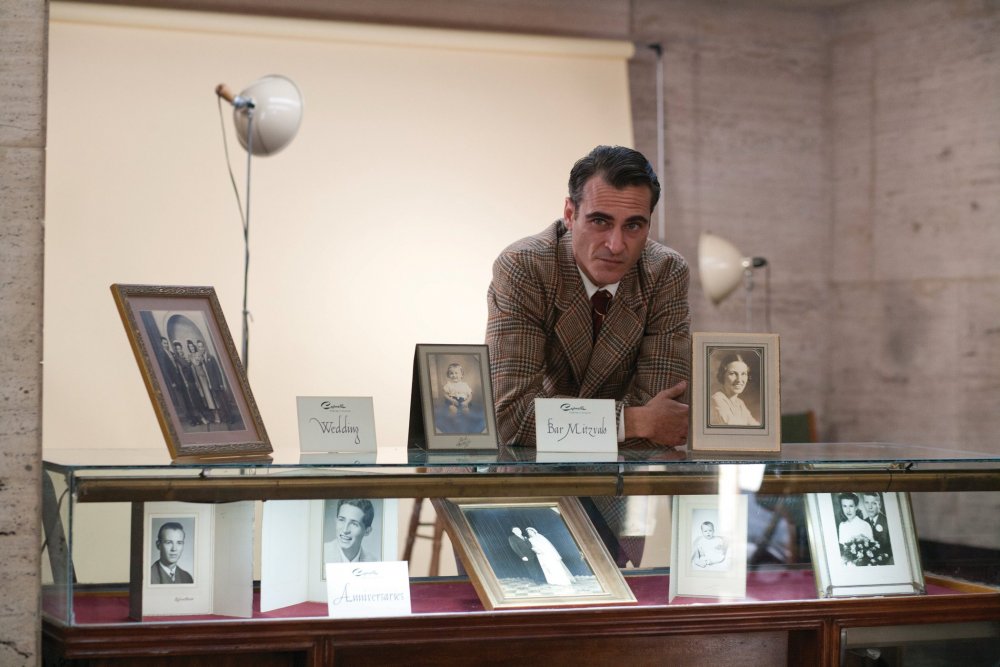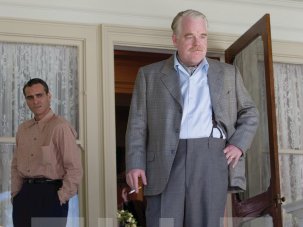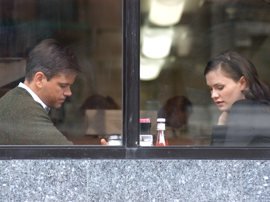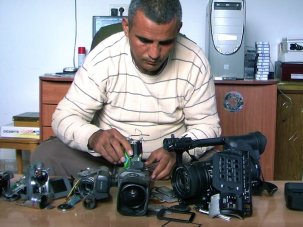Full web edition

The Master
Melissa Anderson
Critic, USA
Barbara
Christian Petzold, Germany
Holy Motors
Leos Carax, France/Germany
Magic Mike
Steven Soderbergh, USA
Neighbouring Sounds (O Som ao Redor)
Kleber Mendonça Filho, Brazil
Tabu
Miguel Gomes, Portugal/Germany/France
Geoff Andrew
Head of film programme, BFI Southbank, UK
Five favourite new films (all of them, quite by accident, to do with love):
Amour
Michael Haneke, France/Germany/Austria
Haneke’s magisterial meditation on mortality, loss and love benefits from pitch-perfect performances. Unflinchingly honest, terribly tender and enormously moving.
Like Someone in Love
Abbas Kiarostami, France/Japan
That first word of the title tells all about Kiarostami’s playful yet profound Japanese film – a wise, witty series of sentimental journeys undertaken (probably) in the conditional mood.
Everybody in Our Family (Toata Lumea din Familia Nostra)
Radu Jude, Romania/Netherlands
Jude’s impressive follow-up to The Happiest Girl in the World is a rollercoaster tragicomedy about parental love and (ex-) marital distrust going frighteningly awry.
What Is Love
Ruth Mader, Austria
Mader’s second feature (coming nine years after Struggle) is a quietly wonderful quasi-documentary contemplation of the varieties of love; for once sex barely comes into it.
Silence
Pat Collins, Ireland/Germany
Also quasi-documentary, Collins’s feature debut about an Irish sound engineer seeking locations free from man-made sound is finally a touching love-letter to the notion of home.
Highlights
The best Berlinale I’ve yet attended (besides the Jude and Mader films, it boasted Caesar Must Die, Tabu, Sister, The Last Friday, Avalon and Just the Wind); the Dreyer season at BFI Southbank; the Jean Grémillon retrospective and the restored longer version of Once upon a Time in America at Bologna’s Il Cinema Ritrovato festival; hosting what turned out to be a very illuminating onstage interview with Abbas Kiarostami (and meeting up with numerous film folk) at the Morelia Film Festival; and finally the release, on DVD, of Víctor Erice’s La Morte Rouge and the news that he was behind the camera again, directing an episode for the compilation film Histórias do cinema.
Sergio Angelini
Critic, UK
To Rome with Love
Woody Allen, USA
Uneven and overlong but loving and tonally spot-on omaggio to the Italian anthology film – a melancholy divertimento undeserving of its general snubbing by critics and public alike.
Killing Them Softly
Andrew Dominik, USA
A George V. Higgins adaptation that shoehorns political commentary uneasily into its story of gangland self-destruction, but caps it with a beautifully delivered closing speech that kicks the film into touch – and its (too small) audience in the balls.
The Dark Knight Rises
Christopher Nolan, USA/UK
A threequel that curiously seems to lose momentum as its plot got busier but which, at its core, offers a genuinely challenging revolutionary parable masquerading as a comic-book Hollywood blockbuster.
Skyfall
Sam Mendes, USA/UK
That true heart-warming rarity: a mega-budget franchise entry that actually lives up to the hype.
Highlight
On the small screen the best in contemporary drama, dominated by Scandinavian entries such as Borgen and The Bridge, was to be found in the many foreign-language releases. The most notable of these include Israel’s riveting Prisoners of War serial, the food-obsessed Italian cases of Inspector Montalbano and the bracingly malodorous French policier Braquo.
Michael Atkinson
Critic, USA
The Turin Horse (A Torinói ló)
Béla Tarr, Hungary/Switzerland/Germany/France/USA
Post Mortem
Pablo Larraín, Chile/Germany/Mexico
Once upon a Time in Anatolia (Bir Zamanlar Anadolu’da)
Nuri Bilge Ceylan, Turkey/Bosnia and Herzegovina
Alps (Alpis)
Yorgos Lanthimos, Greece
Almayer’s Folly (La Folie Almayer)
Chantal Akerman, Belgium/France
Cameron Bailey
Artistic director, Toronto International Film Festival, Canada
The Master
Paul Thomas Anderson, USA
The most persuasive filmmaking I saw all year.
Camp 14: Total Control Zone
Marc Wiese, Germany/South Korea
For its simple testimony of unimaginable horror, this is the one film from 2012 I’d urge everyone to see.
The Place Beyond the Pines
Derek Cianfrance, USA
Audacious storytelling of the kind that dares an audience to stay with it. After Blue Valentine, Cianfrance proves the purity of his filmmaking.
Ship of Theseus
Anand Gandhi, India
One of the reasons why Mumbai’s independent filmmaking is finally getting noticed around the world. Gandhi knows how to ask interesting questions purely through film language.
The Reluctant Fundamentalist
Mira Nair, USA/India/Turkey/Pakistan)
Making a globe-trotting political thriller with substance has got to be one of the hardest things in cinema to do – the failures are so evident and so common. Nair pulls it off with an adaptation of Mohsin Hamid’s novel that’s both frequently exhilarating. Much of that is down to Riz Ahmed, who is terrific.
James Bell
Sight & Sound, UK
The Master
Paul Thomas Anderson, USA
Spring Breakers
Harmony Korine, USA
No
Pablo Larraín
Margaret
Kenneth Lonergan, USA
A Hijacking
Tobias Lindholm, Denmark
Anton Bitel
Critic, UK
After inexplicably omitting horror from my Sight & Sound ten-year poll list, I’m atoning with five (sort-of) genre titles here – all standouts of my viewing year:
American Mary
Jen & Sylvia Soska, Canada
As a sidelined and abused trainee doctor transfers her skills to a more accepting alternative subculture, with horrifying and tragic results, the Soska twins surgically modify the ‘norms’ of the American dream – and let the ugly sutures show – in a tale of rape-revenge and radical self-realisation.
Berberian Sound Studio
Peter Strickland, UK
In Strickland’s Lynchian meta-horror, a withdrawn English sound engineer working on a misogynistic slice of 1970s Italian horror gradually confronts his own selective hearing and casual complicity. Silenzio!
Detachment
Tony Kaye, USA
It might seem the odd one out in this list, but in staging the horrors of social atomisation, economic neglect, creeping corporatisation and ’ubiquitous assimilation’, Kaye’s film is in a class of its own, leaving little room for indifference.
Excision
Richard Bates Jr, USA
A perfect double-feature with American Mary, this feature debut carves up the growing pains of an adolescent outsider in desperate need of a mother’s love – and deftly shifts gears from the satire of Welcome to the Dollhouse to the alienating horror of May. As the disturbed teen, AnnaLynne McCord is simply extraordinary.
A Night of Nightmares
Buddy Giovinazzo, USA
Thanks to its focus on a pair of well-drawn, quirky characters and their flirtatiously innuendo-laced dialogue, the charms of Buddy Giovinazzo’s (almost) two-hander are real but also deceptive in their simplicity. As this endearingly oddball romance blurs its generic identity with psychosis and metempsychosis, the viewer is wrongfooted with one disorienting curveball after another, until the penny finally drops. It’s masterfully manipulative, and comes right out of leftfield.
Honourable mentions go to Antiviral, Bonsai, Cosmopolis, King of Pigs, Looper, Once upon a Time in Anatolia and The Tall Man.
Nick Bradshaw
Sight & Sound, UK
The Act of Killing
Joshua Oppenheimer, Denmark/Norway/UK
Once upon a Time in Anatolia
Nuri Bilge Ceylan
August and After
Nathaniel Dorsky, USA
Five Broken Cameras
Emad Burnat & Guy Davidi, France/Israel/Netherlands/UK/USA/Canada/South Korea/Finland/Switzerland
The House I Live In
Eugene Jarecki, Netherlands/UK/Germany/Japan/Australia/USA
Highlights
A triumphant year for documentaries that make art of political testimony – led by The Act of Killing, Joshua Oppenheimer’s astoundingly intimate and inventive reckoning with the ongoing malignity of Indonesia’s genocidal 1965 coup (by recourse to collaborative re-enactments with the killers). Word up too for Ra’anan Alexandrowicz’s The Law in These Parts, a forensic cross-examination of the judges who lend legal veneer to Israel’s Palestinian occupation – and a useful flipside to Five Broken Cameras, with its plaintive impressions from the receiving end.
Speaking of pairings, in surely the most plutocratic American election year in well over a century, two of the country’s best documentarians offered yin-and-yang perspectives on its class divide. While Alex Gibney’s Park Avenue: Wealth, Power and the American Dream is an outraged j’accuse directed at the country’s self-entitled upper class, Eugene Jarecki’s panoramic drug-war essay The House I Live In brings to mind Martin Niemöller’s famous “first they came for” adage, here running from Chinese hopheads, Mexican dope-smokers and jazz junkies to white-trash tweekers. “Why not say, ‘Kill the poor’? – it would be easier,” muses David Simon…
Peter Bradshaw
The Guardian, UK
The Master
Paul Thomas Anderson, USA
Perhaps it should have been called The Disciple. The sheer, radioactive strangeness of the film is what exerts the initial grip — then the outstanding performance of Joaquin Phoenix as Freddie Quell, the troubled alcoholic who may have found his life’s meaning in The Cause, as laid down by Lancaster Dodd, a visionary played with Falstaffian brio by Philip Seymour Hoffman.
Amour
Michael Haneke, France/Germany/Austria
An unbearably painful, intimate drama about life’s end, perhaps in some ways more human and more lenient than his earlier work, but with that icy and uncompromising exactitude.
Stories We Tell
Sarah Polley, Canada
After her bizarrely written relationship drama Take This Waltz [review], I almost despaired of Sarah Polley. But then she gave us this wonderful, personal documentary about her parents, a jewel at this year’s Venice Film Festival.
Holy Motors
Leos Carax, France/Germany
A cinephile’s delight and, more importantly, a cinemagoer’s delight. Carax returned this year with this sensual, surreal odyssey about M. Oscar, an existential master of disguise who tours Paris in his stretch limo, inhabiting numberless personae.
This Is Not a Film (In Film Nist)
Jafar Panahi & Mojtaba Mirtahmasb, Iran
Panahi’s courage is glorious – and a rebuke to those who take lightly our cinema or art or freedom of speech. Having endured a prison sentence from the Iranian government for his pro-democracy campaigning, as well as a ban on directing films or leaving the country once his sentence expires, Panahi has managed to contrive this remarkable samizdat document.
Highlight
Going to BFI Southbank for its 60th anniversary to see the Queen greet its various officials, and also to watch a 1953 3D film called Royal Review, all about her duties – and realise that her life has continued in that vein, uninterruptedly, from that day to this.
Nicole Brenez
Critic, France
Natpwe – Feast of the Spirit
Tiane Doan na Champassak & Jean Dubrel, France/Burma, 2003 – released in 2012
Three Sisters
Wang Bing, China
Jajouka, quelque chose de bon vient vers toi
Eric & Marc Hurtado, France/Morocco
Leviathan
Lucien Castaing-Taylor & Véréna Paravel, France/UK/USA
Our Body Is a Weapon: Prison
Clarisse Hahn, France
Highlights
Actua 1 (1968) by Philippe Garrel et al, rediscovered at last in a lab. DocLisboa 2012 – a magnificent edition of the festival under four new directors: Susana de Sousa Dias, Ana Jordão, Cinta Pelejà and Cíntia Gil.
Michael Brooke
Critic, UK
A year largely immersed in back catalogues meant that I missed most 2012 festival faves, but I did catch these:
Berberian Sound Studio
Peter Strickland, UK
Strickland more than confirms Katalin Varga’s promise with this immensely affectionate yet decidedly disturbing love letter to garish 1970s Italian horror films and the often sorely underutilised creative potential of the film soundtrack.
Caesar Must Die (Cesare deve morire)
Paolo & Vittorio Taviani, Italy
When I rediscovered the Tavianis’ back catalogue in 2011, I had no idea that they were shooting their best film in two or three decades. This study of genuine convicts rehearsing Shakespeare’s Julius Caesar is both a conceptual departure and a wholly unexpected return to their black-and-white, overtly politicised roots
Margaret
Kenneth Lonergan, USA
Six years after wrapping, Lonergan’s film equivalent of the archetypal difficult second album finally emerged in its original three-hour cut, the better to display its novelistic density and the acuity of its central mother-and-daughter portrait.
Rose (Róza)
Wojciech Smarzowski, Poland
Already a forceful chronicler of his country’s less salubrious aspects, Smarzowski in his latest film vividly reconstructs post-WWII horrors, where women with the slightest German links became Red Army fuck-toys, and the Polish authorities collaborated in blatant ethnic cleansing.
This Is Not a Film (In Film Nist)
Jafar Panahi & Mojtaba Mirtahmasb, Iran
When asked why he made films, Krzysztof Kieslowski replied, “I don’t know how to do anything else” – a sentiment that the domestically incarcerated and creatively hobbled Jafar Panahi would readily recognise. This partly iPhone-shot video diary (not a film) is also an act of civil disobedience of sometimes breathtaking bravery.
Highlight
The London Olympics Opening Ceremony wasn’t a film, but it was made by a filmmaker as a heartfelt tribute to a distinguished forebear – and whoever would have thought that Humphrey Jennings’s ideas, spirit and ineffable sense of Britishness would get such a massive global showcase?
Edward Buscombe
Critic and academic, UK
Highlight
Once again this year I was on the jury for the award made by the Satyajit Ray Foundation for the best first feature shown at the BFI London Film Festival. Within the past year several of the films that were on our shortlist for the 2011 award got a UK release, including Las acacias and Martha Marcy May Marlene – though not, such are the vagaries of distribution, our winning film, a beautiful Italian production titled Li and the Poet.
We have not yet made a decision on this year’s festival winner, but a very strong candidate is the British film Shell, a powerful but sensitive exploration of the emotional pressures on a lonely young girl, with an excellent performance by Chloe Pirrie and script and direction by Scott Graham. Other first features worth an honourable mention are the Dutch production Kauwboy, the Brazilian film Neighbouring Sounds and the Indian drama Ship of Theseus.
The event that had the most significance for me was the 20th anniversary of the first titles published in the BFI Film Classics series of books. To celebrate the event there was a panel discussion at the NFT that tried to answer the question: what is a classic? I don’t think we arrived at a definitive answer, but despite the absence of such, the series is in rude health, with over 160 titles published so far, containing some of the best writing about cinema in these two decades.












